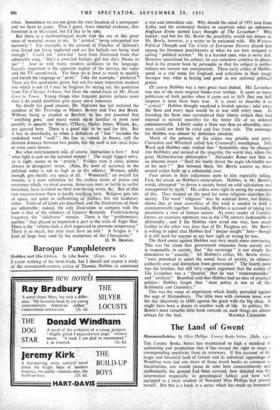Baroque Pamphleteers
Hobbes and His Critics. By John Bowie. (Cape. /Os. 6d.) I KNOW nothing of the book-trade, but I should not expect a study of the seventeenth-century critics of Thomas Hobbes to command a vast and immediate sale. Why should the mind of 1951 turn from Kafka and the existential theatre to ascertain what an unknown Anglican divine named Lucy thought of The Leviathan ? Why indeed ; and but for Mr. Bovile the possibility would not detain us_ Mr. Bowie, however, is a writer to be reckoned with. • His Western Political Thought and The Unity of European History placed him among the foremost practitioners at what we are now resigned to calling "political science." He is a learned man, who is never dull. However specialised his subject, he can somehow contrive to please. And in his present book he persuades us that his subject is neither tedious nor narrow nor unimportant. These early critics of Hobbes speak in a real sense for England, and articulate in "their rough baroque way what is lasting and good in our national political genius.
Of course Hobbes was a very great man indeed. His Leviathan was one of the most original books ever written. It upset so many politicians of both parties when it came out in 1651 that one half suspects it must have been- true. It is usual to describe it as .`.! cynical." Hobbes thought mankind a brutish species ; take away the State and every man would be at war with eirery man. In founding the State men surrendered their liberty (which they had enjoyed in natural anarchy) for the better life of an ordered commonwealth. Liberty under a State was thus an absurdity, since man cotdd not both --be ruled and free from rule. The sovereign for Hobbes was almost by definition absolute.
Much of the _polemic of his critics was pitiable and -petty. Clarendon and Whitehall called him Cromwell's mouthpiece. Seth Ward said Hobbes only wished that Aristotility may be -changed into Hobbeity and instead of the stagyrite, the world may adore the great Malmesburian philosopher." Alexander Rosse saw him as , an obscene insect—" Shall the beetle thrust the eagle (Aristotle) out of his nest-? " But between them, Mr. Bowie assures us, these several critics built up a substantial case.
Four points in their indictment seem to him especially telling_ First, the attack on Hobbes's materialism. Hobbes, in Mr. Bowie's words, attempted "to devise a society based on cold calculation and unsupported by myth." His critics were right in seeing the weakness of this. They insisted on the need for some religious sanctions Or society. The word " religious " may be watered down, but history shows that at least something of this kind is needed to hold a commonwealth together. Secondly, Hobbes is accused of taking too pessimistic a view of human nature. As every reader of Candide knows, an excessive optimism was in the 17th century fashionable in philosophy; and if the Hobbes view erred one way, how mueh further in the other way does that of Dr. Pangloss err. Mr. Bowie is willing to admit that Hobbes had "deeper insight" here—though it is still hard for anyone to say how right_or wrong he was.
The third count against Hobbes was very much more convincing. This was the claim that government emanates from society and is responsible to society, that "the sovereign" is not simply the alternative to "anarchy." All Hobbes's critics, Mr. Bowie writes, "were provoked to assert the moral basis of society, its ultimate authority over and distinction from government." The fourth point was the familiar, but still very cogent argument that the author of The Leviathan was a "theorist," that he was " unstatesmanlike " and "artificial." Bramhall said that Hobbes had no idea of practical politics ; Hobbes forgot that "state policy is not at all like Arithmetic and Geometry."
This was the voice of empiricism which finally prevailed against the sage of Malmesbury. The little men with common sense won the day (decisively in 1688) against the giant with the big ideas. It might have been a shame in another walk of life. In politics; Mr. Bowie's most valuable little book reminds us, such things are almost


































 Previous page
Previous page